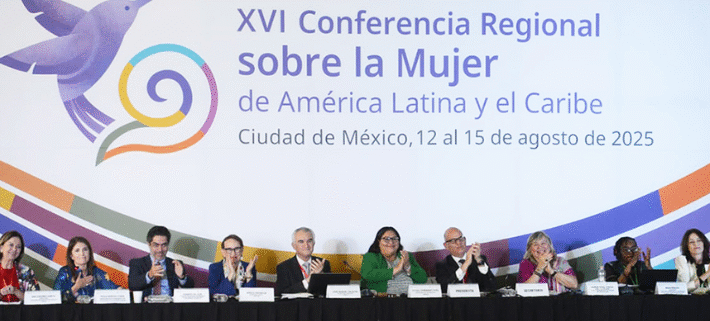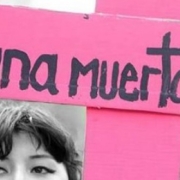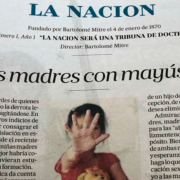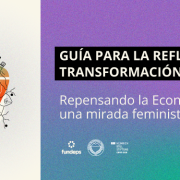We participated in the XVI Regional Conference on Women in Latin America and the Caribbean
Fundeps took part in the XVI Regional Conference on Women in Latin America and the Caribbean, held from August 11 to 15 in Mexico City.
The Regional Conference on Women takes place every three years and is a key event to drive progress in gender equality across the region. It is a subsidiary body of the Economic Commission for Latin America and the Caribbean (ECLAC) and the main United Nations intergovernmental forum on women’s rights and gender equality in the region. Since 1977, it has convened regularly to analyze regional and subregional situations regarding women’s autonomy and rights, and to present recommendations on gender equality public policies, in compliance with regional and international agreements.
Romina Pezzelato, coordinator of the Gender and Diversity Area, represented Fundeps in the extensive agenda of “side events” officially supported by CEPAL. These gatherings brought together civil society representatives from across the region to deepen dialogue and debates around the human right to care, the central theme of this year’s Conference.
Throughout the week, one of the most significant highlights was the response of the Inter-American Court of Human Rights to Argentina’s request for an advisory opinion, recognizing the right to care as an autonomous right—that is, not only as an aspect linked to other rights but as a right in itself—across three dimensions: the right to provide care, the right to receive care, and the right to self-care. Based on this position, the IACHR recommended that states in the region implement public policies that guarantee dignity, equality, and shared responsibility in the provision of care throughout the life cycle.
Care as a concept of struggle and community resistance
In a regressive regional context, where the rise of right-wing forces compels us to uphold networks and actions that protect hard-won rights, many of the debates centered on sustaining agendas that push for public policies guaranteeing the right to care. Defending care as an act of sovereignty for women situates us not within our homes ensuring the reproduction of life, but as protagonists in struggles such as the defense of land, the environment, food sovereignty, and sexual and reproductive rights, among others.
On Monday, August 11, the Feminist Forum took place as a precursor to the XVI Regional Conference on Women. Feminists from more than 150 civil society organizations across Latin America and the Caribbean came together to make their voices heard by governments. As a result of an intense day of debate, a document was drafted and read at the official Conference by a representative of the Otrans organization, addressing authorities present:
“Neither silence, nor setbacks, nor nostalgia, nor consolation. Thirty years after Beijing, we demand justice. We call on States to return to the basics: to place life, social, racial and ecological justice, as well as gender equality and the protection of human rights, at the center. We also invite you to be bold and creative in your responses. Feminists have been building collective, sustainable and radical strategies for decades, which must be recognized and incorporated into State debates.”
In another strong document outlining the many dimensions of the right to care in the current regional context, the Feminist Forum also stated:
“We demand clear commitments to the most humanizing agenda of all: one that promotes an economic, political, social, and cultural model that generates well-being, is sustainable, and places care at the center. An agenda that has defended the recognition of the right to decide over our own bodies and life projects. One that guarantees social justice with a restorative and reparative approach. The agenda of substantive equality supported by feminisms. From Palestine to Haiti, we demand peace, justice, and equality!”
The Commitment of Tlatelolco is the name of the official document resulting from the XVI Regional Conference on Women, in which regional governments pledged to develop public policies aimed at reducing inequality gaps that continue to weigh on the bodies of women and LGBTQI+ people.
At Fundeps, we reaffirm our ongoing commitment to advocacy actions that engage with each of these demands in defense of human rights.
Contact:
Romina Pezzelato, romina.pezzelato@fundeps.org









